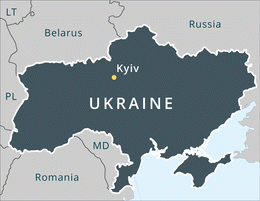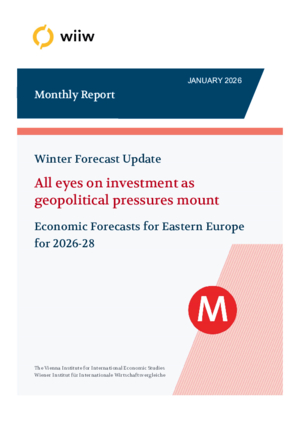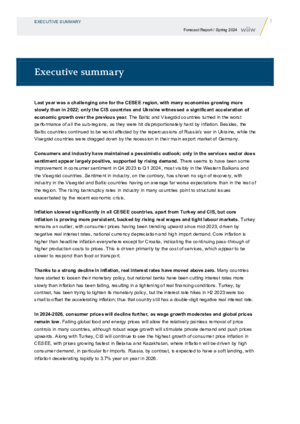Ukraine

The outlook is worsening. In 2025 the growth of Ukraine’s economy slowed to about 2%, compared to 3.2% in 2024. The main factors behind the sluggish dynamics were the country’s poor export performance following the bad harvest of 2024, massive missile attacks by Russia (which led to the destruction of infrastructure and production facilities) and a severe electricity shortage at the end of the year, as well as the continued labour shortage. The key growth factors were fiscal stimulus and robust consumer demand on the back of strong wage growth amidst a slowdown in inflation. As the chances of a ceasefire or armistice in the near future are very low, we expect the war with Russia to drag on throughout 2026-2028. Therefore, we have downgraded our GDP growth forecast for 2026 to 2.5% and forecast only a slight acceleration in 2027-2028 to 3.5% and 4%, respectively. Economic growth will be further supported by private consumption and government spending on infrastructure, public and private investment in arms production, and additionally by recovering exports.
| |
|
|
|
FORECAST* |
| Main Economic Indicators | 2023 | 2024 | 2025 | 2026 | 2027 | 2028 |
| Population, 1000 persons | 36700 | 37000 | . | . | . | . |
| GDP, real change in % | 5.5 | 3.2 | 2.0 | 2.5 | 3.5 | 4.0 |
| GDP per capita (EUR at PPP) | 11010 | 11330 | . | . | . | . |
| Gross industrial production, real change in % | 6.8 | 4.6 | -2.4 | . | . | . |
| Unemployment rate - LFS, in %, average | 20.0 | 14.0 | 12.0 | 10.0 | 9.0 | 7.0 |
| Average gross monthly wages, EUR | 441 | 494 | . | . | . | . |
| Consumer prices, % p.a. | 12.9 | 6.5 | 12.7 | 8.0 | 7.0 | 6.0 |
| Fiscal balance in % of GDP | -20.1 | -17.6 | -20.0 | -18.0 | -15.0 | -12.0 |
| Public debt in % of GDP | 83.3 | 91.1 | 98.0 | . | . | . |
| Current account in % of GDP | -5.2 | -8.0 | -16.0 | -16.0 | -14.0 | -13.0 |
| FDI inflow, EUR m | 4227 | 3712 | 2019 | . | . | . |
| Gross external debt in % of GDP | 86.8 | 98.1 | 102.0 | . | . | . |
Basic data are continuously updated.
* Forecasts are changed beginning of January, April, July and November.
See Press Conferences.
publication_icon
Monthly Report No. 1/2026
Vasily Astrov, Alexandra Bykova, Selena Duraković, Meryem Gökten, Richard Grieveson, Maciej Grodzicki, Ioannis Gutzianas, Doris Hanzl-Weiss, Gabor Hunya, Branimir Jovanović, Biljana Jovanovikj, Niko Korpar, Dzmitry Kruk, Sebastian Leitner, Isilda Mara, Emilia Penkova-Pearson, Olga Pindyuk, Sandor Richter, Marko Sošić, Bernd Christoph Ströhm and Marina Tverdostup
wiiw Monthly Report No. 1, January 2026
58 pages including 6 Tables and 15 Figures
Details
publication_icon
Executive summary
Olga Pindyuk
in: The Crisis is Over, but its Scarring Effects are Hindering Recovery
wiiw Forecast Report No. Spring 2024, April 2024 , pp. I-VII
Details
The outlook is worsening. In 2025 the growth of Ukraine’s economy slowed to about 2%, compared to 3.2% in 2024. The main factors behind the sluggish dynamics were the country’s poor export performance following the bad harvest of 2024, massive missile attacks by Russia (which led to the destruction of infrastructure and production facilities) and a severe electricity shortage at the end of the year, as well as the continued labour shortage. The key growth factors were fiscal stimulus and robust consumer demand on the back of strong wage growth amidst a slowdown in inflation. As the chances of a ceasefire or armistice in the near future are very low, we expect the war with Russia to drag on throughout 2026-2028. Therefore, we have downgraded our GDP growth forecast for 2026 to 2.5% and forecast only a slight acceleration in 2027-2028 to 3.5% and 4%, respectively. Economic growth will be further supported by private consumption and government spending on infrastructure, public and private investment in arms production, and additionally by recovering exports.


